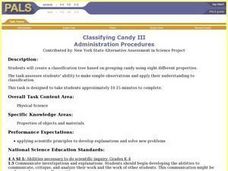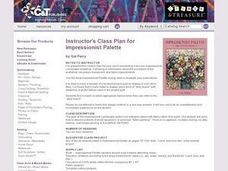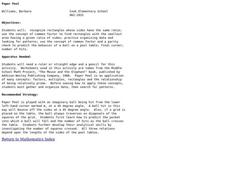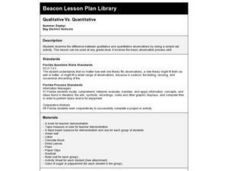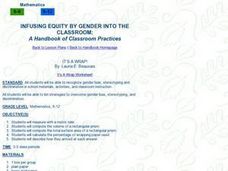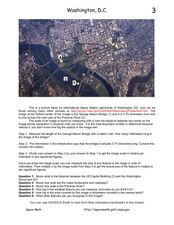Curated OER
Classifying Candy III
Students create a classification tree based on grouping candy with eight different properties. This allows students to understand how living things are classified.
Curated OER
Color Dots 3
Young scholars make simple observations, test mixtures, and make generalized inferences from their observations. They observe bleeding of colored inks with water.
Curated OER
Instructors Lesson Plan for Impressionist Palette
Students examine the goal of the Impressionist Landscape quilter to interpret nature with fabric rather than paint. Students discover how to blend hundreds of small squares in a luminous "fabric painting." There is no appliqué, no fabric...
Curated OER
Exploring Length and Perimeter
Sixth graders determine the perimeter of geometric shapes with a grid at technology based resource. While looking at figures on an overhead, they determine how much border they would need to go around a figure. They also complete...
Curated OER
Paper Pool
Students analyze the measurements of rectangles. In this analysis lesson, students will investigate patterns by looking at ratios. Students will also hypothesize the probability of a ball going into a certain pocket when playing pool....
Curated OER
Creating Communities
Young scholars design a community with minimal environmental impact. They rate each other's community's presentation using the "Planning and Zoning Commission Rating Scale".
Mathematics Vision Project
Module 6: Congruence, Construction, and Proof
Trace the links between a variety of math concepts in this far-reaching unit. Ideas that seem very different on the outset (like the distance formula and rigid transformations) come together in very natural and logical ways. This unit...
Curated OER
Qualitative Vs. Quantitative
Fourth graders examine the difference between qualitative and quantitative observations by doing a simple lab activity. This lesson can be used at any grade level. It involves the basic observation process skill.
Curated OER
Kool Kumara Lesson Plans
Learners explore and observe the plant world and acquire knowledge about the functional parts of plants. In this Kool Kumara lesson, students make observations and record specific data on a recording sheet. Learners estimation length,...
Curated OER
Math: a World of Symmetry
Students expand their knowledge of quadrilaterals and identify basic symmetrical forms. Over three weeks, they explore the math, application, and discussion of symmetry. After conducting Internet research, students create symmetrical...
Curated OER
Mathematics: It's a Wrap!
Students calculate the amount of wrapping paper needed to wrap boxes. They describe how they determined their answers.
Curated OER
The Furry News: How to Make a Newspaper
Students investigate the process of making a newspaper using children's literature to create context for the lesson plan. The readers are asked to predict the events of the story as it is read to them. Then the teacher uses guided...
Curated OER
Learning Lesson: A Pressing Engagement
Students complete experiments in which they discover the effect of the weight of the air above them. They use different weights of paper to complete the experiment. They also examine thunderstorm safety.
Curated OER
How Much Gift Wrap Do I Need?
Students estimate the area of boxes using centimeter cubes. They find the actual area and compare it to the estimates.
Curated OER
Make a Dinosaur
Students estimate the size of dinosaurs and create a dinosaur model. They create bar graphs of the sizes of dinosaurs one in meters and the other in "student" units. They draw a pictures and add words or sentences about their dinosaur.
Curated OER
Jupiter and Io
In this Jupiter and Io worksheet, students use a diagram of the planet and its moon to find the dimension of the image, the width of the largest feature in the atmosphere of Jupiter, the width of the smallest feature in the atmosphere of...
Curated OER
Asteroid Eros
In this asteroid image worksheet, students observe a photograph taken by the NEAR imager and they determine the scale of the image following the given steps. They solve 4 problems using the scaled image and determine the dimensions, the...
Curated OER
How Big is a Lunar Crater?
In this lunar crater worksheet, students use an image taken by the Lunar Orbiter spacecraft to find the scale of the image and determine the diameter of the lunar crater Tycho. They also find the size of the smallest and largest features...
Curated OER
Washington D.C. from Space
In this Washington D.C. from space worksheet, students use a picture generated by the International Space Station and they find the scale of the image. They determine the actual size of features in the image, they find the distances...
Curated OER
Water on Mars!
In this water on Mars worksheet, students use a diagram to answer four questions about the structures in the image. They find the dimensions of the image, the width of the streams half-way down their flow channels, the smallest feature...
Curated OER
Craters on the Moon
In this moon craters worksheet, students use a high resolution image of the lunar surface and calculate the image scale in meters per millimeter. They use the image scale to find the largest crater in the image, the smallest crater, the...
Curated OER
Mars Rover Landing Site
In this Mars Rover Landing worksheet, students are given an image of Mars near the Bonneville Crater. Students determine the image scale in the diagram and use it to find the diameter of the Bonneville Crater, the width of the Rover's...
Curated OER
Exploring a City from Space
For this exploring cities from space worksheet, students use a satellite image from the QuickBird Satellite to determine the image scale. They use the image scale to calculate the length of the Bellagio Hotel in Las Vegas, the length of...
Curated OER
Educating K-12 Students about Glacier Dynamics in a Changing Climate
Students determine which of the following parameters, slope, ice, temperature or basal condition affects the glacier speed the most. They create their own experiment to test what influences glacier speed and temperature of the ice.


